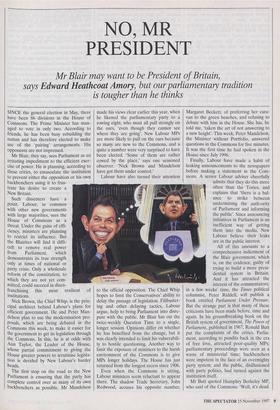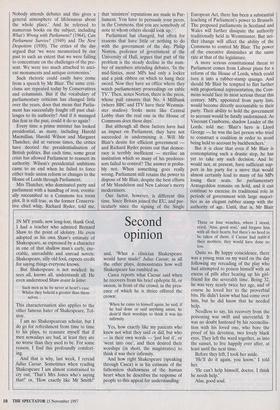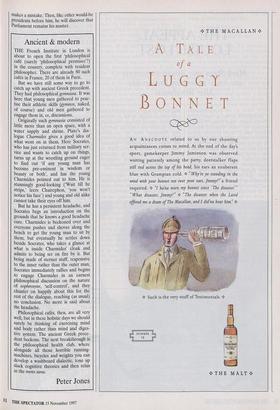NO, MR PRESIDENT
Mr Blair may want to be President of Britain, is tougher than he thinks
SINCE the general election in May, there have been 86 diyisions in the House of Commons. The Prime Minister has man- aged to vote in only two. According to friends, he has been busy rebuilding the nation and has therefore elected to make use of the 'pairing' arrangements. His opponents are not impressed.
Mr Blair, they say, sees Parliament as an irritating impediment to the efficient exer- cise of power. He is planning, according to these critics, to emasculate the institution to prevent either the opposition or his own backbenchers using it to frus- trate his desire to create a New Britain.
Such dissenters have a point. Labour, in common with other new governments with large majorities, sees the House of Commons as a threat. Under the guise of effi- ciency, ministers are planning to restrict its influence. But the Blairites will find it diffi- cult to remove real power from Parliament, which demonstrates its true strength only at times of national or party crisis. Only a wholesale reform of the constitution, to which they are not yet com- mitted, could succeed in disen- franchising this most resilient of institutions.
Nick Brown, the Chief Whip, is the prin- cipal architect behind Labour's plans for efficient government. He and Peter Man- delson plan to use the modernisation pro- posals, which are being debated in the Commons this week, to make it easier for the government to get its legislation through the Commons. In this, he is at odds with Ann Taylor, the Leader of the House, whose partial commitment to giving the House greater powers to scrutinise legisla- tion is derided by New Labour's harder heads.
The first stop on the road to the New Parliament is ensuring that the party has complete control over as many of its own backbenchers as possible. Mr Mandelson made his views clear earlier this year, when he likened the parliamentary party to a rowing eight, who must all pull strongly on the oars, 'even though they cannot see where they are going', New Labour MPs are more likely to pull on the oars because so many are new to the Commons, and a quite a number were very surprised to have been elected. 'Some of them are rather cowed by the place,' says one seasoned observer. 'Nick Brown and Mandelson have got them under control.'
Labour have also turned their attention to the official opposition. The Chief Whip hopes to limit the Conservatives' ability to delay the passage of legislation. Filibuster- ing and other delaying tactics, Labour argue, help to bring Parliament into disre- pute with the public. Mr Blair has cut the twice-weekly Question Time to a single, longer session. Opinions differ on whether he has benefited from the change, but it was clearly intended to limit his vulnerabili- ty to hostile questioning. Another way to limit the exposure of ministers to the harsh environment of the Commons is to give MPs longer holidays, The House has just returned from the longest recess since 1906.
Even when the Commons is sitting, Labour ministers seem reluctant to appear there. The shadow Trade Secretary, John Redwood, accuses his opposite number, Margaret Beckett, of preferring her cara- van to the green benches, and refusing to debate with him in the House. She has, he told me, 'taken the art of not answering to a new height'. This week, Peter Mandelson, the Minister without Portfolio, answered questions in the Commons for five minutes. It was the first time he had spoken in the House since July 1996.
All of this amounts to a comprehensive indictment of the Blair government, which is, on the evidence, guilty of trying to build a more presi- dential system in Britain. And it has attracted the interest of the commentators; in a few weeks' time, the Times political columnist, Peter Riddell, will publish a book entitled Parliament Under Pressure. But the strange part is that many of these criticisms have been made before, time and again. In his groundbreaking book on the British system of government, The Power of Parliament, published in 1967, Ronald Butt put the complaints of the critics. Parlia- ment, according to pundits back in the era of free love, attracted poor-quality MPs; parliamentary proceedings were seen as a waste of ministerial time; backbenchers were impotent in the face of an overmighty party system; and the public, disillusioned with party politics, had turned against the institution itself.
Mr Butt quoted Humphry Berkeley MP, who said of the Commons: 'Well, it's dead. Nobody attends debates and this gives a general atmosphere of lifelessness about the whole place.' And he referred to numerous books on the subject, including What's Wrong with Parliament? (1964), Can Parliament Survive? (1949) and The New Despotism (1930). The critics of the day argued that 'we were mesmerised by our past to such an extent that we were failing to concentrate on the challenges of the pre- sent. We were too much attached to anci- ent monuments and antique ceremonies.'
Such rhetoric could easily have come from a speech by Mr Blair. The same criti- cisms are repeated today by Conservatives and columnists. But if the vocabulary of parliamentary criticism has changed little over the years, does that mean that Parlia- ment has successfully fought off past chal- lenges to its authority? And if it managed this feat in the past, could it do so again?
Every time a prime minister has looked presidential, as many, including Harold Macmillan, Harold Wilson and Margaret Thatcher, did at various times, the critics have decried the presidentialisation of British politics. But each time, some great crisis has allowed Parliament to reassert its authority. Wilson's presidential ambitions came to an end when he failed to force either trade union reform or changes to the House of Lords through Parliament.
Mrs Thatcher, who dominated party and parliament with a handbag of iron, eventu- ally succumbed to a Commons tea room plot. It is still true, as the former Conserva- tive chief whip, Richard Ryder, told me, that 'ministers' reputations are made in Par- liament. You have to persuade your peers, in the Commons, that you are somebody of note to whom others should look up.'
Parliament has changed, but often for reasons that have little or nothing to do with the government of the day. Philip Norton, professor of government at the University of Hull, argues that part of the problem is the steady decline in the num- ber of members attending debates. 'In the mid-Sixties, most MPs had only a locker and a pink ribbon on which to hang their sword. Now they have an office where they watch parliamentary proceedings on cable TV.' Then, notes Norton, there is the press, whose pull ensures that No. 4 Millbank (where BBC and ITV have their Westmin- ster studios) 'looks more like Central Lobby than the real one in the House of Commons does these days'.
But although all these factors have had an impact on Parliament, they have not succeeded in undermining it. Will Mr Blair's desire for efficient government and Richard Ryder points out that democ- racy is terribly inefficient — sterilise an institution which so many of his predeces- sors failed to control? The answer is proba- bly not. When something goes really wrong, Parliament still retains the power to dispose of Mr Blair, despite the best efforts of Mr Mandelson and New Labour's merry modernisers.
One factor, however, is different this time. Since Britain joined the EU, and par- ticularly since the signing of the Single European Act, there has been a substantial leaching of Parliament's power to Brussels. The proposed parliaments in Scotland and Wales will further dissipate the authority traditionally held in Westminster. But nei- ther change will affect the ability of the Commons to control Mr Blair. The power of the executive diminishes at the same rate at that of the legislature.
A more serious constitutional threat to Parliament comes from Labour plans for a reform of the House of Lords, which could turn it into a rubber-stamp quango. And should Mr Blair be tempted to flirt further with proportional representation, the Com- mons would face its most serious threat this century. MPs, appointed from party lists, would become directly accountable to their party. Their ability to hold the government to account would be fatally undermined. As Viscount Cranborne, shadow Leader of the Lords, told me: `Blair's hero is Lloyd George — he was the last person who tried to construct a coalition in order to avoid being held to account by backbenchers.'
But it is clear that even if Mr Blair is contemplating such a drastic step, he has yet to take any such decision. And he would not, at present, have sufficient sup- port in his party for a move that would almost certainly lead to many of his MPs losing their seats. So parliamentary Armageddon remains on hold, and it can continue to exercise its traditional role in periods of government with large majori- ties as an elegant rubber stamp with the authority of age. Until, that is, Mr Blair makes a mistake. Then, like other would-be presidents before him, he will discover that Parliament remains his master.












































































 Previous page
Previous page